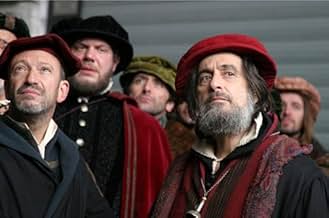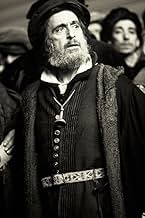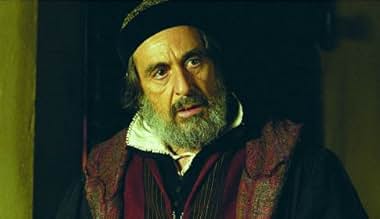Shakespeare-Verfilmung, die im Venedig des 16. Jahrhunderts spielt.Shakespeare-Verfilmung, die im Venedig des 16. Jahrhunderts spielt.Shakespeare-Verfilmung, die im Venedig des 16. Jahrhunderts spielt.
- Regie
- Drehbuch
- Hauptbesetzung
- Nominiert für 1 BAFTA Award
- 2 Gewinne & 7 Nominierungen insgesamt
- Aragon
- (as Antonio Gil-Martinez)
Empfohlene Bewertungen
This very enjoyable film is a balance of both, tragedy and comedy. As is both delightful, disturbing and dramatically marvellous. Al Pacino delivers a wonderfully complex and dark performance. His portrayal is pretty watchable and absolutely memorable, he's a Shakespeare expert , like he proved in ¨Looking for King Richard III¨ which he starred and and directed. I found particularly nice the way the film handled the court rivalry , the antagonism between them and final result. The movie packs an evocative musical score by Jocelyn Pock(Eye wide shut) and colorful cinematography by Benoit Delhomme, director's usual cameraman. The motion picture is well directed by Michael Radford. Another adaptation about this known book are mostly made for TV, these are the following : 1973 with Laurence Olivier, Joan Plowright and Jeremy Brett ; 1980 by Jack Gold with Warren Mitchell and John Rhys Davies ; 2001 by Trevor Nunn with Henry Goodman. And by Orson Welles with Oja Kodar but was scrapped and pretended to release with other of his unfinished movies, though never completed when the negatives were mysteriously lost. I would recommend this picture to anybody interested by Shakespeare.
If you get a chance to hear Radford speak about the film, I highly recommend you take it, since he gives details about life in 16th century Venice that illuminate a lot of the choices he made and give considerable extra depth to the viewing. I'm hoping that the DVD will come out with extensive commentary.
Jeremy Irons does a gorgeous portrayal of Antonio, a man who resigns himself to bearing the burden of his past misdeeds. Lynn Collins, a relative unknown, gives us an absolutely flawless, stunning, and detailed job as Portia. Not only is Ms. Collins beautiful - she also gives Portia layers of intelligence and humor prior to the trial scene i've rarely seen in any production of this play. the rest of the cast also does a terrific job, with a notable performance by Kris Marshall as Gratiano, and a beautifully subtle work by Allan Corduner as Tubal, playing the foil to Shylock. Finally, while Al Pacino pulls out his usual strong (and loud) performance, his best moments are when the camera focuses on him and he says no words, but you can see all the emotions and madnesses flowing into and out of him as he perceives his fortunes changing.
If you like period movies, I cannot recommend this movie enough.
The film deftly explores the themes of love vs loyalty, law vs justice, and passion vs reason. Some might protest that the content is inherently anti-semitic, however they should consider the historical context of the story, and the delicate and nuanced way in which it is told in this adaptation.
9/10
The movie does a great job of complicating the character of Shylock, and makes the viewer question his role as a victim or a villain. In the end, nobody will feel unmoved by the truly excellent and genuinely poignant court scene.
The courting prices are shallow stereotypes and constitute the only kind of (unintentional) humour this otherwise dry movie brings. I do not understand the choice of not giving the play-appropriated importance and weight in consequence to the casket-scenes. This is strange, since the movie is clearly a dramatized version of the play, and else there is not much that distinguishes Portia from a common harlot when every man can come make his suit without consequence. It saddens me to see the superficiality of these scenes, because Shakespeare did provide more complex and sympathetic characters in the original.
The text is quite stripped down with many passages cut. But, I only noticed one line which was cut at the moment when I expected to hear it - and it was replaced by a look that said it all. This economy and judicious editing has given us a gripping movie - not just a film of the play.
And at last, there is a rationale as to why Antonio is so loyal and generous to the undeserving/unrelated Bassanio - you can almost feel Antonio's pulse start to race when he catches glimpse of Bassanio passing by in a gondola, or arriving for a visit. But it is as subtle as that - no more. I was spellbound.
There were many other highlights. I felt the arguments during the trial to be heartbreaking. And, the suitors' trials are hilarious.
Add all that to glorious cinematography and costumes that resonated with the times, and you'll understand why I can't wait to see it again. And again.
Wusstest du schon
- WissenswertesThe bare-breasted prostitutes were not put in the film to make it more risqué, but rather to add a note of historical authenticity. Venetian law at the time required all prostitutes to bare their breasts because the Christian authorities were concerned about rampant homosexuality in their city.
- PatzerIn Venice in 1598 a woman with no head-dress and her hair flowing loose would be taken for a whore, yet this is how Portia frequently appears.
- Zitate
Shylock: I am a Jew! Hath not a Jew eyes? hath not a Jew hands, organs, dimensions, senses, affections, passions? Fed with the same food, hurt with the same weapons, subject to the same diseases, healed by the same means, warmed and cooled by the same winter and summer, as a Christian is? If you prick us, do we not bleed? if you tickle us, do we not laugh? if you poison us, do we not die? And if you wrong us, shall we not revenge? If we are like you in the rest, we will resemble you in that. If a Jew wrong a Christian, what is his humility? Revenge. If a Christian wrong a Jew, what should his sufferance be - by Christian example? Why, revenge. The villany you teach me, I will execute, and it shall go hard - but I will better the instruction.
- Crazy CreditsPROLOGUE: "Intolerance of the Jews was a fact of 16th century life even in Venice, the most powerful and liberal city state in Europe."
"By law the Jews were forced to live in the old walled foundry or 'Geto' area of the city. After sundown the gate was locked and guarded by Christians."
"In the daytime any man leaving the ghetto had to wear a red hat to mark him as a Jew."
"The Jews were forbidden to own property. Thus, they practiced usury, the practice of lending money at interest. This was against Christian law."
"The sophisticated Venetians would turn a blind eye to it but for the religious fanatics, who hated the Jews, it was another matter . . . "
- VerbindungenFeatured in 'Merchant of Venice': Shakespeare Through the Lens (2005)
- SoundtracksWith Wand'ring Steps
Composed by Jocelyn Pook, Lyrics by John Milton
Arranged by Jocelyn Pook
Performed by Baroque Strings Quartet Ensemble, featuring solo vocals by Andreas Scholl
Harp: Siobhan Armstrong
Psaltery: Harvey Brough
Lute: Elizabeth Kenny
Published by Shylock Ltd / EMI Music Publishing Ltd
© 2004 Decca Music Group Limited
(p) Jocelyn Pook Ltd. /2004 Decca Music Group Limited
Top-Auswahl
Details
- Erscheinungsdatum
- Herkunftsländer
- Offizielle Standorte
- Sprachen
- Auch bekannt als
- The Merchant of Venice
- Drehorte
- Esch-sur-Alzette, Luxemburg(only Venice film set)
- Produktionsfirmen
- Weitere beteiligte Unternehmen bei IMDbPro anzeigen
Box Office
- Budget
- 30.000.000 $ (geschätzt)
- Bruttoertrag in den USA und Kanada
- 3.765.585 $
- Eröffnungswochenende in den USA und in Kanada
- 69.868 $
- 2. Jan. 2005
- Weltweiter Bruttoertrag
- 21.560.182 $
- Laufzeit2 Stunden 11 Minuten
- Farbe
- Sound-Mix
- Seitenverhältnis
- 2.35 : 1










































